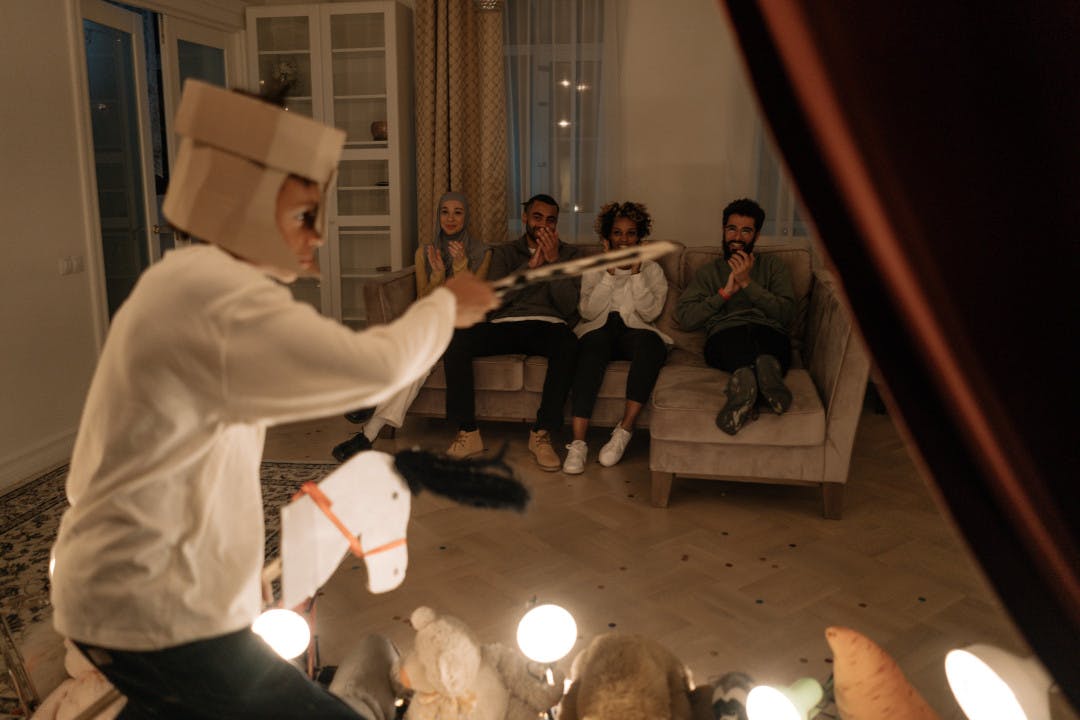From Stage Right to Stage Life...Lessons From Theater
Do you remember your school play, when you performed?
Did you attend a drama or theater class?
Do you remember the nerves, the butterflies in your stomach, the shiver in your legs?
Then, when it was your turn to speak your lines, it all went away. Most people would say that the biggest social benefit to theater class is increased confidence, and that may be true, but there are a lot of steps and growing to be done before the confidence kicks in. Performing in front of others takes a lot of courage, and to muster that courage, it first takes trust. So, the first thing I would always do with any new group of students was to play trust-building games - not the ones we’ve seen in the movies where someone falls backwards hoping there’ll be trustworthy people behind them to catch them - we’ve all seen that one fail way too many times to trust in that game! These games are more about figuring out how to unlock an imaginary treasure box as a team - where no idea is bad and all ideas have to be tried at least once. Of course, I learned the hard way that there had to be solid rules around what kind of ideas were acceptable for young kids!
No trying to blow up the imaginary box with invisible weapons, or anything that could cause harm. Just like an Escape Room, these types of games encourage people to work together to find solutions, but I always gave higher praise to the teams that came up with the most creative “out of the box” solution, rather than to simply “blow it up”. Again, these exercises have long-lived success on and off the stage.

"All the World's a Stage; And all the men and women merely players"
- William Shakespare
I could get on a soap box about the myriad skills gained from theater, mainly because I spent so much of my teaching time trying to explain to parents and the school board WHY drama in school is crucial for some kids - but I’ll narrow them down to what I consider to be the five biggies:
1. Oral and Written Communication
Only some of the kiddos I taught could read, and for many, English was their second language. Nonetheless, all students who took theater classes improved their English to some degree. This was especially true for the very shy and neurodivergent kids.
2. Cooperation and Co-Construction
I mention these two together because theater class, at least the one I taught, was about giving everyone a chance to participate. Sure there are natural-born leaders, but sometimes the leaders need to take a back seat and listen to what some of the quieter students have to offer. When everyone participates in a way that allows their individual strengths to shine, that’s co-construction of the best kind!

3. Dedication and Persistence
This one is often missed but for a chronic procrastinator like myself, the skill of “sticking to it” until the final curtain, is huge! There’s a lot of doubt and frustration that can creep in along the way when preparing for a performance, and when you’re part of a team, you get to cheer each other on and clap for each other’s successes at the final bow.
4. Self-Discipline
Preparing for a performance needs to happen in and out of rehearsal. Much of it is done at home, in front of a mirror, alone, or with friends and family. Learning lines, cues, and sometimes songs and dance moves, takes a lot of time and practice. The more self-discipline an actor has, the better the final performance will be and the more fun they will have on stage!
5. FUN!!
Learning how to PLAY, to take oneself less seriously, to be silly, and to laugh at our own follies and mistakes is one of the things I find most valuable to this day.

Shauna Ray Ratapu
Shauna Ray Ratapu is a retired Drama Teacher turned screenwriter and author. She is mother to three children ages 25-32, three fur babies (two dogs and a cat). She enjoys walks on the beach and spending time with family.
Read More HERE! Wireless Articles
How to Be a Life Coach for your Child
Timeless Wisdom from Grandparents
All Articles
Life Begins Outside the Screen
Block Out the Distractions with Cloud Safeguard
Start a HERE! Wireless Plan with Website Filtering
